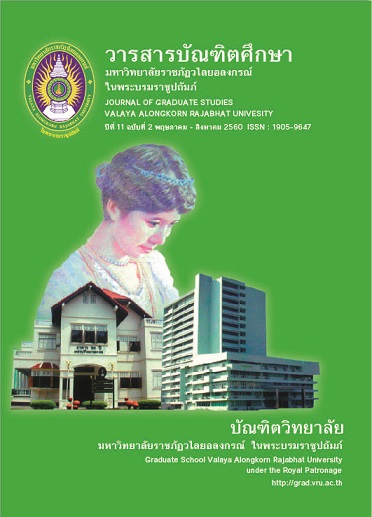การพัฒนาโปรแกรมเสริมสร้างทักษะการเรียนตามแนวคิดการเรียนรู้เพื่อสร้างสรรค์ด้วยปัญญาและการเรียนรู้ด้วยการนำตนเองสำหรับนิสิตระดับปริญญาตรี ชั้นปีที่ 1 มหาวิทยาลัยเกษตรศาสตร์ วิทยาเขตเฉลิมพระเกียรติ จังหวัดสกลนคร
Main Article Content
Abstract
บทคัดย่อ
การวิจัยครั้งนี้มีวัตถุประสงค์คือ 1) เพื่อพัฒนาโปรแกรมเสริมสร้างทักษะการเรียนตามแนวคิดการเรียนรู้เพื่อสร้างสรรค์ด้วยปัญญาและการเรียนรู้ด้วยการนำตนเอง 2) เพื่อศึกษาผลการทดลองใช้โปรแกรมที่มีต่อความรู้ ความเข้าใจ ทักษะการเรียน และความพึงพอใจของนิสิต กลุ่มตัวอย่างได้แก่ นิสิตระดับปริญญาตรี ชั้นปีที่ 1 มหาวิทยาลัยเกษตรศาสตร์ จำนวน 57 คน ได้มาจากวิธีเลือกแบบเจาะจง เครื่องมือที่ใช้ในการวิจัย ได้แก่ แบบทดสอบความรู้ความเข้าใจ แบบประเมินทักษะการเรียน และแบบประเมินความพึงพอใจ วิเคราะห์ข้อมูลโดยใช้โปรแกรมสำเร็จรูป สถิติที่ใช้คือ ค่าเฉลี่ย ค่าเฉลี่ยร้อยละ ส่วนเบี่ยงเบนมาตรฐาน และการทดสอบค่าที ชนิด Dependent Samples ผลการวิจัยพบว่า
1. โปรแกรมเสริมสร้างทักษะการเรียน มีองค์ประกอบที่สำคัญ 6 ประการ คือ 1) แนวคิดพื้นฐาน 2) หลักการ 3) วัตถุประสงค์ 4) เนื้อหา 5) กระบวนการและ 6) การวัดและประเมินผลกระบวนการของโปรแกรมแบ่งออกเป็น 6 ระยะ ระยะที่ 1 สร้างความรู้ ความเข้าใจให้เห็นคุณค่า ระยะที่ 2 นำมาฝึกปฏิบัติให้เห็นผล ระยะที่ 3 พัฒนาตนให้บรรลุสู่เป้าหมาย ระยะที่ 4 ขยายการเรียนรู้สู่ผลงานที่สร้างสรรค์ ระยะที่ 5 แบ่งปันและเรียนรู้กับผู้อื่น และ ระยะที่ 6 หยัดยืนมุ่งมั่นสู่ฝันที่เป็นจริง
2. ผลการทดลองใช้โปรแกรม พบว่า 1) ความรู้ ความเข้าใจเกี่ยวกับทักษะการเรียนของนิสิตหลังเข้าร่วมการพัฒนาสูงกว่าก่อนเข้าร่วมการพัฒนาอย่างมีนัยสำคัญทางสถิติที่ระดับ .05 และค่าเฉลี่ยร้อยละของคะแนนหลังการพัฒนาเท่ากับ 85.85 เมื่อเทียบกับเกณฑ์การประเมินจัดอยู่ในระดับดีที่สุด 2) ทักษะการเรียนของนิสิตหลังเข้าร่วมการพัฒนาสูงกว่าก่อนเข้าร่วมการพัฒนาอย่างมีนัยสำคัญทางสถิติที่ระดับ .05 และค่าเฉลี่ยร้อยละของคะแนนหลังการพัฒนาเท่ากับ 84.85 เมื่อเทียบกับเกณฑ์การประเมินจัดอยู่ในระดับมากที่สุด 3) ความพึงพอใจต่อโปรแกรมของนิสิตที่เข้าร่วมการพัฒนามีค่าเฉลี่ยเท่ากับ 4.46 เมื่อเทียบกับเกณฑ์การประเมินจัดอยู่ในระดับมาก
ABSTRACT
The purposes of this study were: 1) to develop a program to enhance learning skill based on the concepts of Constructionism and self-directed learning, 2) to investigate effectiveness of the program in order to achieve the following aspects: knowledge, learning skill, and satisfaction of the students. A sample used was 57 first-year undergraduate students, Kasetsart University. Using purposive sampling technique. The instruments used in study were a test of knowledge and understanding, a form for assessment of learning skill, and a form for assessing satisfaction. Data were analyzed using Statistical package. Statistics used were mean, percentage mean, standard deviation and t-test. The findings of study were as follows.
1. The program for enhancing the learning skill was composed of 6 key elements: 1) the basic idea, 2) principles, 3) objectives, 4) contents, 5) process, and 6) measurement and evaluation. The program is divided into 6 phases. phase 1–create knowledge and understanding about the value of what students do, phase 2– lead to effective action, phase 3 – develop themselves in order to succeed, phase 4 – expand learning to creative works, phase 5 – share and learn with others, and phase 6 – insist and strive toward their dream
2. The results of experiment in using the program disclosed as shown in the following details: 1) Knowledge and understanding about learning skill gained an average percentage of 85.85 which was significantly higher than that before the development at the .05 level and when compared to the assessment criteria, it was at the best level. 2) The students’ learning skill gained an average percentage of 84.85 which was significantly higher than that before the development at the .05 level and when compared to the assessment criteria, it was at the highest level. 3) The students who participated in development of the program were satisfied at high level with a mean score of 4.46.
Article Details

This work is licensed under a Creative Commons Attribution-NonCommercial-NoDerivatives 4.0 International License.
บทความทุกเรื่องได้รับการตรวจความถูกต้องทางวิชาการโดยผู้ทรงคุณวุฒิ ทรรศนะและข้อคิดเห็นในบทความ Journal of Global of Perspectives in Humanities and Social Sciences (J-GPHSS) มิใช่เป็นทรรศนะและความคิดของผู้จัดทำจึงมิใช่ความรับผิดชอบของบัณฑิตวิทยาลัย มหาวิทยาลัยราชภัฏวไลยอลงกรณ์ ในพระบรมราชูปถัมภ์ กองบรรณาธิการไม่สงวนสิทธิ์การคัดลอก แต่ให้อ้างอิงแหล่งที่มา


